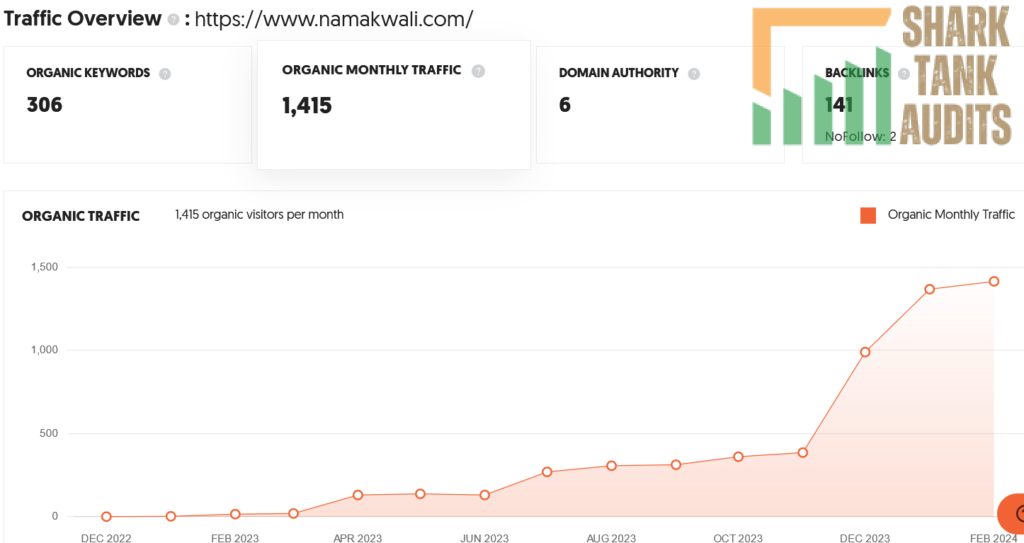Namakwali Shark Tank India Episode Review
Website Information:
- Website:- Namakwali
- Build on E-commerce Shopify
- SEO Improvement Needed
- ORGANIC TRAFFIC:- 1,415 organic visitors per month
Founders and Story:
- In 2018, Shashi Bahuguna Raturi and Suvendu Raturi founded Namakwali in the tranquil hills of Uttarakhand, showcasing their dedication to organic farming and traditional practices.
- Namakwali’s product line features artisanal offerings such as chutneys, A2 Badri Cow Ghee, honey, and Pahadi spice mixes, meticulously crafted without the use of preservatives or chemicals.

About the Company:
Namakwali empowers a community of women from Uttarakhand. They handcraft ethnic Himalayan products using traditional methods like the “silbatta” (stone grinder). Their offerings include Pahadi Pahadi-flavoured salts, A2 Ghee made from the milk of indigenous cows, and various masalas, pulses, and herbs. They emphasize healthy, authentic products sourced directly from Himalayan villages.
Products:
- Hand-ground flavoured salts with health benefits
- A2 Ghee crafted using traditional methods
- Organic spices, masalas, seeds, herbs, pulses, and honey
- Sampler selections featuring unique Himalayan products
Growth and Revenue:
Namakwali has witnessed significant growth. Their sales figures for FY 2023-2024 (up to October) stand at Rs 38 lakhs, compared to Rs 11 lakhs in FY 2022-2023 and Rs 5 lakhs in the previous year. Monthly sales figures also show an upward trend, with October reaching Rs 9.5 lakhs, following Rs 7.6 lakhs in September and Rs 4.3 lakhs in August. They maintain a healthy profit margin of 17% (up to October 2023).
Shark Tank India Episode AIR Date:
- Episode 35, 8 March 2024
Shark Tank India Pitch:
- Namakwali requested Rs 50 lakhs for 5% equity at a valuation of Rs 10 crores.
- Amit offered Rs 10 lakhs for 5% equity at a valuation of Rs 2 crores with an additional Rs 40 lakhs debt at 8% interest for 3 years.
- Namakwali accepted Amit’s offer.

Namakwali Shark Tank India Review Website Data
| Aspect | Description | Data/Stat |
|---|---|---|
| Website | Namakwali | – Build on Shopify |
| Traffic | Organic | 1,415 visitors per month |
| Business Potential | ||
| * Market Size (Organic Food) | India | ₹50,000 crore (USD 6.7 billion) by 2025 (Research and Markets) |
| * TAM (Estimated) | Premium Himalayan Products | ₹2,000 crore (USD 268 million) |
| Target Audience | ||
| * Demographics | Age 25-50, Tier 1 & 2 cities, High disposable income | – |
| * Psychographics | Health-conscious, Value organic/natural products, Appreciate tradition & ethical sourcing, Active on social media | – |
| Marketing Strategy | Content & Digital Marketing | |
| * Website | – Improve SEO for organic traffic growth. – Create blog posts featuring Himalayan recipes, product stories, and benefits of organic ingredients. | – |
| * Social Media | Collaborate with health & wellness websites/publications to feature Namakwali products and brand stories. | – |
| * Content Marketing Partnerships | Demonstrated growth and profitability indicate a strong market fit | – |
| Distribution Strategy | Omnichannel Approach | |
| * Existing Platforms | Maintain presence on existing e-commerce platforms | – |
| * Expansion | Premium online grocery stores (Bigbasket, Amazon Pantry) & partnerships with organic/gourmet stores | – |
| Advantages | ||
| * Products | Handcrafted, organic Himalayan products with unique flavors and health benefits | – |
| * Social Impact | Empowering women and promoting sustainable practices | – |
| * Profitability | Demonstrated growth and healthy profit margins (17% as of Oct 2023) | – |
| Challenges | ||
| * Brand Awareness | Limited brand recognition compared to established players | – |
| * Scaling Production | Maintaining quality and consistency while meeting growing demand | – |
| * Logistics & Distribution | Ensuring freshness and timely delivery of perishable products | – |
| Reasons for Success | ||
| * Market Demand | Caters to the growing demand for organic and artisanal food | – |
| * Value Proposition | Combines unique flavors, quality ingredients, ethical sourcing, and social impact story | – |
| * Early Traction | Demonstrated growth and profitability indicate strong market fit | – |
| Mitigation Strategies | ||
| * Marketing | Targeted campaigns to increase brand awareness | – |
| * Partnerships | Collaborate with established distributors and logistics providers | – |
| * Quality Control | Implement robust quality control procedures | – |
| Future Roadmap | ||
| * Increase Valuation | Brand awareness campaigns, distribution channel expansion, explore new product lines (Himalayan teas, herbal blends) | – |
| * Product Innovation | Develop new offerings based on market research and customer feedback | – |
| * Direct-to-Consumer | Explore subscription service for curated Namakwali product assortments | – |
| * Social Responsibility | Partner with NGOs supporting Himalayan communities and environmental conservation | – |
Namakwali: Scaling the Peaks of Organic Success

Business Potential in India:
- Rising Organic Food Market: The Indian organic food market is projected to reach ₹50,000 crore (USD 6.7 billion) by 2025, driven by growing health consciousness and disposable income (Source: Research and Markets).
- Increasing Demand for Artisanal Products: Consumers are seeking unique and high-quality food products, creating an opportunity for Namakwali’s handcrafted offerings.
- Government Support: Initiatives like the Organic Farming Scheme promote organic production, potentially benefiting Namakwali’s sourcing network.
Total Addressable Market (TAM):
- Considering the Indian organic food market size of ₹50,000 crore and Namakwali’s focus on premium Himalayan products, a conservative TAM estimate could be ₹2,000 crore (USD 268 million).
Ideal Target Audience:
- Demographics: Age 25-50, residing in Tier 1 & 2 cities across India, with a high disposable income.
- Psychographics: Health-conscious, appreciate organic and natural products, value tradition and ethical sourcing, active on social media.
Marketing Strategy:
Content & Digital Marketing Strategy:
- Website Optimization: Improve SEO to increase organic traffic from 1,415 visitors per month. Leverage existing website content and create engaging blog posts featuring Himalayan recipes, product origin stories, and the benefits of organic ingredients.
- Social Media Marketing: Build a strong presence on Instagram, Pinterest, and Facebook with visually appealing content showcasing product usage, behind-the-scenes glimpses, and customer testimonials. Partner with relevant food bloggers and influencers for promotions.
- Content Marketing Partnerships: Collaborate with health and wellness websites/publications to feature Namakwali products and the brand story.
Distribution Strategy:
- Omnichannel Approach:
- Maintain a strong presence on existing e-commerce platforms.
- Expand to premium online grocery stores like Bigbasket and Amazon Pantry.
- Explore partnerships with select organic or gourmet food stores in major cities.
Advantages:
- Unique Product Offering: Handcrafted, organic Himalayan products with distinct flavors and health benefits.
- Strong Social Impact: Empowering a community of women and promoting sustainable practices.
- Profitability: Demonstrated growth trajectory and healthy profit margins (17% as of Oct 2023).
Challenges:
- Brand Awareness: Limited brand recognition compared to established players.
- Scaling Production: Maintaining quality and consistency while meeting growing demand.
- Logistics and Distribution: Ensuring freshness and timely delivery of perishable products across India.
Reasons for Success:
- Addressing a Growing Market: Caters to the increasing demand for organic and artisanal food products.
- Strong Value Proposition: Combines unique flavors, quality ingredients, ethical sourcing, and a social impact story.
- Early Traction: Demonstrated growth and profitability indicate a strong market fit.
Mitigation Strategies:
- Targeted Marketing Campaigns: Utilize effective digital marketing strategies to reach the ideal target audience and increase brand awareness.
- Strategic Partnerships: Collaborate with established organic food distributors and logistics providers to ensure efficient nationwide distribution.
- Quality Control Measures: Implement robust quality control procedures throughout the production process to maintain product consistency.
Future Business Roadmap:
- Increase Valuation: Focus on brand awareness campaigns, expand distribution channels, and explore new product lines (e.g., Himalayan teas, herbal blends) to demonstrate a clear path to growth for investors.
- Product Innovation: Continuously develop new and innovative product offerings based on market research and customer feedback.
- Direct-to-Consumer Model: Explore establishing a subscription service for regular deliveries of curated Namakwali product assortments.
- Social Responsibility: Partner with NGOs supporting Himalayan communities and environmental conservation efforts.
By implementing this comprehensive business plan, Namakwali can leverage its unique positioning and strong foundation to become a leading player in the Indian organic food market.
Conclusion:
Namakwali’s dedication to organic produce, traditional methods, and community empowerment has resulted in impressive growth. Their successful Shark Tank India pitch secures funding and mentorship to take their vision of sharing Himalayan goodness further.



